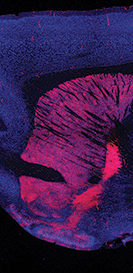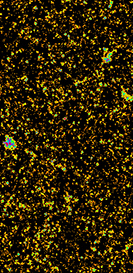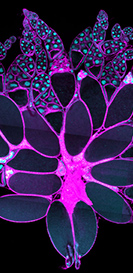MCB TRANSCRIPT





Chairs' Note: Richard Harland and David Raulet
Welcome to the Spring 2015 issue of the MCB transcript. The last issue introduced five new faculty members and this issue introduces seven more, including four who arrived in January 2014 or earlier (Helen Bateup, James Hurley, Evan Miller and Kaoru Saijo) and three who arrived since (Xavier Darzacq, Hernan Garcia and Stephan Lammel). These new colleagues all enrich our environment immeasurably. We encourage those of you on campus to get to know each of them if you have not already done so.
This year, we have three faculty searches underway, including one in cancer biology, one in neurobiology, joint with the Helen Wills Neuroscience Institute, and a third in the areas of microbiology, immunology, and/or infectious disease, under the auspices of the Center for Emerging and Neglected Diseases (CEND).
In early 2014, the Innovative Genomics Initiative (IGI) was established at the Li Ka Shing Center for Genomic Engineering with a $10 million gift from the Li Ka Shing Foundation. The gift also created an affiliated faculty chair in genomic engineering, which IGI Executive Director and MCB Professor Jennifer Doudna currently holds. The IGI is also led by Co-Director Jonathan Weissman (UCSF), and Administrative Directors Michael Botchan (Berkeley) and Keith Yamamoto (UCSF). Scientific Director Jacob Corn, an Assistant Adjunct Professor, arrived on the Berkeley campus in 2014 and numerous researchers have since joined the team.
The IGI, which celebrated its Grand Opening in February 2015, is anchored in the pioneering CRISPR/Cas9 gene editing methods invented by Doudna, for which she was awarded the 2015 Breakthrough Prize in life Sciences. The method uses an RNA guidance system to target genes in living cells with unprecedented efficiency and specificity. “Dedicated to the enhancement and proliferation of genome editing research and technology”, and to “advancing our understanding of the ways in which genomic information is harnessed to produce complex phenotypes,” the IGI markedly enriches our scientific environment and will enable new cutting edge approaches for advancing the research of all biological sciences researchers at Berkeley and beyond. The addition of topflight new faculty members, exciting developments such as the establishment of the IGI, and the sustained excellence of MCB Department members generally, all underscore the continued success of the MCB Department.














